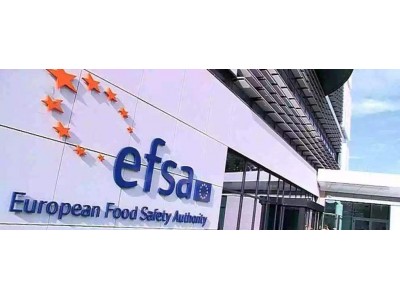У┐ЎуДЇУё»Т░ежЁИуЅ╣т╝ѓТђДт»АУѓйжЁХТў»тѕЕућеУйгтЪ║тЏаж╗ЉТЏ▓жюЅУЄфтЁІжџєТафС║ДућЪуџёУё»Т░ежЁИт»АУѓйжЁХтѕХтЅѓсђѓТгДуЏЪжБЪтЊЂт«ЅтЁет▒ђСИЊт«Ху╗ёт»╣У┐ЎуДЇУё»Т░ежЁИуЅ╣т╝ѓТђДт»АУѓйжЁХуџёт«ЅтЁеТђДУ┐ЏУАїС║єУ»ёС╝░сђѓСИЊт«Ху╗ёу╗ЈУ┐ЄУ»ёС╝░У«цСИ║№╝їУё»Т░ежЁИуЅ╣т╝ѓТђДт»АУѓйжЁХТЌажЂЌС╝аТ»њТђДсђѓт«ЃуџёуЏ«ТаЄСй┐ућеС║║уЙцСИ║СИђУѕгТѕљт╣┤С║║№╝їжбёТюЪТюђтцДСй┐ућежЄЈСИ║Т»Јтц?746 mg TOS/С║║Тѕќ39.2 mg TOS/kg СйЊжЄЇ№╝ѕж╗ўУ«цСИђУѕгТѕљт╣┤С║║уџёСйЊжЄЇСИ║70KG№╝ЅсђЂЧ/div>
 тю░тї║№╝ЎЧ/font>ТгДуЏЪтЏйтцќ
тю░тї║№╝ЎЧ/font>ТгДуЏЪтЏйтцќ
 УАїСИџ№╝ЎЧ/font>У┐ЏтЄ║тЈбЧ/font>
УАїСИџ№╝ЎЧ/font>У┐ЏтЄ║тЈбЧ/font>
 ТаЄуГЙ№╝ЎЧ/font>Тќ░жБЪтЊЂтјЪТќўЧ/font>ТгДуЏЪжБЪтЊЂт«ЅтЁет▒ђEFSA
ТаЄуГЙ№╝ЎЧ/font>Тќ░жБЪтЊЂтјЪТќўЧ/font>ТгДуЏЪжБЪтЊЂт«ЅтЁет▒ђEFSA
 уДЉТЎ«№╝ЎЧ/font>Тќ░жБЪтЊЂтјЪТќўЧ/font>ТгДуЏЪжБЪтЊЂт«ЅтЁет▒ђEFSA
уДЉТЎ«№╝ЎЧ/font>Тќ░жБЪтЊЂтјЪТќўЧ/font>ТгДуЏЪжБЪтЊЂт«ЅтЁет▒ђEFSA
[
жБЪтЊЂУхёУ«»Тљюу┤б] [
тіатЁЦТћХУЌЈ] [
тЉіУ»ЅтЦйтЈІ] [
ТЅЊтЇ░ТюгТќЄ] [
тЁ│жЌГуфЌтЈБ]
жЃетѕєтјЪТќЄТіЦжЂЊтдѓСИІ№╝ЎЧ/div>

Following a request from the European Commission, the EFSA Panel on Dietetic Products, Nutrition and Allergies №╝ѕNDA№╝ was asked to deliver an opinion on proline-specific oligopeptidase №╝ѕTolerase G№╝ as a novel food ingredient submitted pursuant to Regulation №╝ѕEC№╝ No 258/97 of the European Parliament and of the Council, taking into account the comments and objections of a scientific nature raised by Member States. The novel food is an enzyme preparation of prolyl-oligopeptidase produced with a genetically modified Aspergillus niger self clone strain. The target population is the general adult population. The results from a bacterial reverse mutation test and of an in vitro chromosome aberration test did not indicate genotoxicity. The Panel co
nsiders that the reported effects observed in a 90-day rat study are treatment-related effects and can be attributed to the higher energy co
nsumption by these animals. Taking into account the intended maximum use level for Tolerase G, its daily co
nsumption would correspond to 2,746 mg TOS/person or to 39.2 mg TOS/kg body weight №╝ѕbw№╝ per day, when co
nsidering a default body weight of 70 kg for an adult person. The margin between this value and the dose in the rats, which caused effects attributable to the excess energy intake, is approximately 45. Noting this margin, the Panel co
nsiders that it is unlikely that such effects would occur in human at the intended use levels. The Panel co
ncludes that the NF, Tolerase G, is safe for the intended use at the intended use level.
тјЪТќЄжЊЙТјЦ№╝ЎЧ/div>
http://www.efsa.europa.eu/en/efsajournal/pub/4681
уЏИтЁ│Тћ┐уГќУДБУ»╗

ТЌЦТюЪ№╝ЎЧa href="//www.sqrdapp.com/news/2017-02-20.html">2017-02-20
 тю░тї║№╝ЎЧ/font>ТгДуЏЪтЏйтцќ
тю░тї║№╝ЎЧ/font>ТгДуЏЪтЏйтцќ УАїСИџ№╝ЎЧ/font>У┐ЏтЄ║тЈбЧ/font>
УАїСИџ№╝ЎЧ/font>У┐ЏтЄ║тЈбЧ/font> ТаЄуГЙ№╝ЎЧ/font>Тќ░жБЪтЊЂтјЪТќўЧ/font>ТгДуЏЪжБЪтЊЂт«ЅтЁет▒ђEFSA
ТаЄуГЙ№╝ЎЧ/font>Тќ░жБЪтЊЂтјЪТќўЧ/font>ТгДуЏЪжБЪтЊЂт«ЅтЁет▒ђEFSA уДЉТЎ«№╝ЎЧ/font>Тќ░жБЪтЊЂтјЪТќўЧ/font>ТгДуЏЪжБЪтЊЂт«ЅтЁет▒ђEFSA
уДЉТЎ«№╝ЎЧ/font>Тќ░жБЪтЊЂтјЪТќўЧ/font>ТгДуЏЪжБЪтЊЂт«ЅтЁет▒ђEFSA











 ТгДуЏЪУ»ёС╝░УйгтЪ║тЏаујЅу▒│MO
ТгДуЏЪУ»ёС╝░УйгтЪ║тЏаујЅу▒│MO
 ТгДуЏЪУ»ёС╝░СИђуДЇж║дУійу│ќТиђ
ТгДуЏЪУ»ёС╝░СИђуДЇж║дУійу│ќТиђ уЙјтЏйТІЪТњцжћђУІЦт╣▓УѓЅу▒╗тЈЅЧ/a>
уЙјтЏйТІЪТњцжћђУІЦт╣▓УѓЅу▒╗тЈЅЧ/a> ж▓ЂтЁгуйЉт«Ѕтц 37060202000128тЈХЧ/a>
ж▓ЂтЁгуйЉт«Ѕтц 37060202000128тЈХЧ/a>



